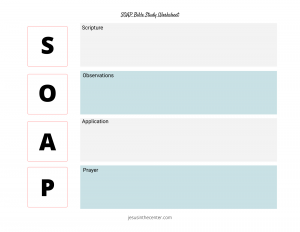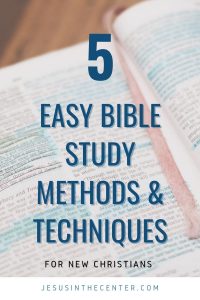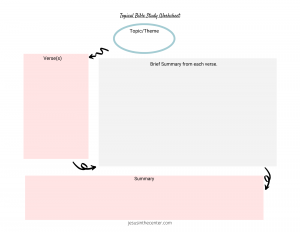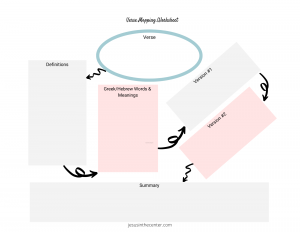How many ways are there to study the Bible? You would think the answer would be straightforward, but it’s not.
There are many methods and techniques used to study the Bible.
What really matters is finding the methods or techniques that work best for you.
We’ll go over 5 of the simplest Bible study methods and techniques.
Easy Bible Study Methods & Techniques
1. Bible Journaling
When I was younger, I used to keep a journal. I would write important milestones, poetry, etc. Pretty much anything that people would typically write in a diary.
What I loved best about my journal was that I could go back and read those entries to see how much I’ve grown and reflected on my life.
Bible journaling is a cross between a personal diary and a record of your Bible study notes. Having a Bible journal is a great way to track your spiritual growth and understanding of the Bible over time.
There is also another form of Bible journaling that involves creating art in your Bible or journal as it relates to scripture, I refer to this as artistic Bible journaling
What Do You Need to Start Bible Journaling?
You don’t need anything special to start Bible journaling aside from the following materials:
- Bible
- Pen/Pencil
- Notebook
2. Devotional Bible Study
If you are a new Christian or new to studying the Bible on your own. Using a devotional is an excellent way to study the Bible.
Most devotionals start with the main scripture, followed by a short story related to the verse. Depending on the devotional you use there may be reflection questions at the end for you to answer.
Devotionals cover a wide range of topics and are best known for their practical application of those topics to your daily life.
You can find devotionals on:
- Motherhood
- Overcoming Anger
- Sex in Marriage
- Experiencing God’s Renewal
- Overcoming addictions
- Etc.
If you’re not sure which type of devotional you want to read, you can download the Bible App by YouVersion on your phone or tablet. It has a wide range of free devotions, Bible reading plans, and Bible translations.
3. Bible Study Acronyms
In my post, How to Study the Bible for Beginners, I showed you 5 simple steps you can use to study the bible on your own.
Bible study acronyms are ways to study the Bible using various words to help you remember the individual steps.
One of the most popular methods is the SOAP Bible study method. SOAP stands for:
S– Scripture
O-Observations
A– Application
P– Prayer

This is just one of many acronyms you can use to help you study the Bible. You can read this post on Bible study acronyms.
If you’re looking for something a little more challenging, these next few bible study methods will help stretch your faith.

4. Theme/Topical Bible Study
Is there a specific topic in the Bible that you want to learn more about? Topical Bible studies are a great way to dive deep into scripture to learn more about what the Bible has to say about specific topics.
What do You Need for a Topical Bible Study?
You will need everything that you would need for a regular bible study plus a concordance.
A Bible concordance lists words in alphabetical order along with where in the Bible you can find that word or variations of that specific word.
The following sites have free Bible concordances:

Steps to Perform a Topical Bible Study
- Choose a Topic/Theme
- Look up the topic/theme in your concordance.
- Write what each verse has to say about the topic.
- Summarize your findings.
A few themes you could look up are Attributes of God, salvation, the Holy Spirit, and promises in the Bible.
5. Verse Bible Study
Do you have a favorite verse of the Bible or a verse that you have a hard time understanding?
Try doing a verse study.
Many verses in the Bible may have a deeper or more complex meaning to them.
Remember the Bible wasn’t written in English. It was originally written in Hebrew and Greek.
When you look at these verses in their original context, you just might learn something new.
How to Study the Bible By Verse

The easiest way to study the Bible by verse is to use a technique called verse mapping.
- Pick a verse- write and read the verse.
- Highlight or circle words you want to clarify.
- Look up the words in a Bible dictionary or regular dictionary. Write down your definitions.
- Look up the words in the original Greek (NT) or Hebrew (OT).
- Read the verse in context. (Read 2-3 verses before and after it.)
- Read the verse in another version.
- Summarize your findings.
Remember when you are doing any of these studies that the Bible was written as a unit.
It is important to always keep in mind the context of every bible passage that you study.
Each book of the Bible was written for a specific audience and has a specific purpose.
Verses can easily be taken out of context and manipulated to fit our own desires and purposes when we forget these basic facts about the Bible.
Make sure any conclusions you come up with during your Bible study line up with the Word of God and not your own personal opinions and philosophies.
Which Bible study methods are you interested in trying? Is there one you would like to learn more about? Let me know in the comments section.
As always, keep Jesus in the center of everything you do.
Your Sister in Christ,
Eboni

